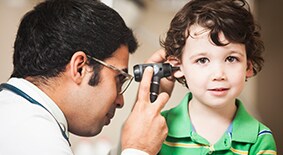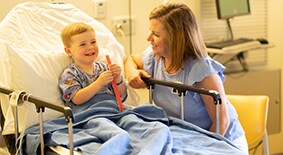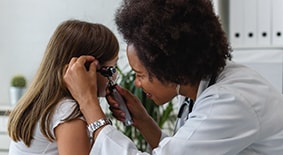How Can I Tell if My Child Needs His Adenoids Removed?
If your child experiences recurrent nasal infections, difficulty breathing through the nose, obstructive sleep apnea, snoring or mouth breathing, a doctor may recommend a pediatric adenoidectomy, which is a surgery performed on children to remove their adenoids.
Adenoids are lymph tissue located in the roof of the mouth behind the soft palate where the nose connects to the throat. They help filter air through your nose and produce antibodies, or white blood cells, that help fight infection.
“Adenoids are most prominent in the first decade of life and typically shrink during adolescence. For many, they disappear by adulthood,” explains Lori G. Gentile, MD, Medical Director of Ambulatory Otolaryngology services at Children’s Healthcare of Atlanta. Also known as ear, nose and throat (ENT) doctors, pediatric otolaryngologists are specially trained in treating children with ENT conditions like sleep apnea, ear infections and strep throat.
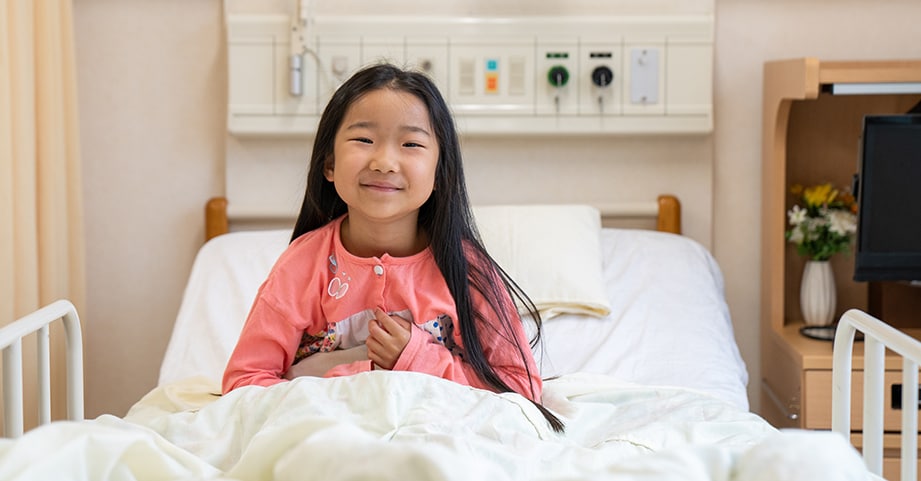
If your child is experiencing any of the following symptoms, your doctor may recommend an adenoidectomy:
- Snoring and obstructive sleep apnea, or blocked breathing during sleep
- Mouth breathing, typically with noticeable mouth odor and the feeling of a plugged nose, which is usually a sign of enlarged adenoids
“Parents typically notice snoring and mouth breathing symptoms pretty easily while checking on kids at night or when they go to wake them up in the morning or after a nap. Chronic sinus infections may be suspected with symptoms like thickened nasal drainage, cough, and possibly fever that does not get better even after medical treatment,” adds Dr. Gentile.
An adenoidectomy is usually done as an outpatient procedure, which means your child will be able to go home the same day as surgery. The procedure is performed under general anesthesia, so your child won’t be aware of the surgery or experience pain during it. And because a child’s anesthesia needs are different, the pediatric anesthesiologists at Children’s are specially trained and experienced to tailor anesthesia and pain management for children and teens whose bodies are still growing. Our team creates a specialized anesthesia plan for each child based on his weight, height and type of surgery.
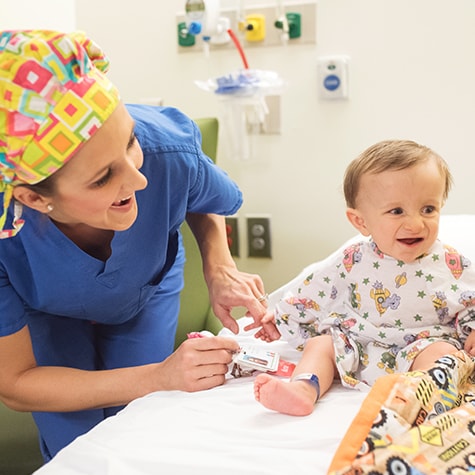
Some facilities can’t guarantee a pediatric anesthesiologist for your child—we do.
While some hospitals may not be staffed to meet this need, at Children’s, every baby, child and teen receives care from a pediatric anesthesiologist who understands best practices for growing bodies.
Learn moreAfter surgery, your child may temporarily experience the following symptoms:
- Discomfort in the back of the nose
- Stuffy nose
- Upset stomach from being under anesthesia
- Low-grade fever (up to 101.5°F or 38.6°C is common the first five days after surgery)
- Sore throat
- Ear or neck pain that stems from where the adenoids were
- Very bad breath that will improve as wounds heal (you can brush your child’s teeth, but it will not help the bad breath)
- Voice changes that usually go away in two or three weeks (your child’s voice may sound higher pitched, muffled or nasally)
- Small specks of blood coming from the nose or in the saliva (or spit)
- While some small specks of blood can be normal, bleeding can be very serious. Any amount of bright red blood, large clots or vomiting of blood is not normal. Call your child’s surgeon if any bleeding occurs, and the doctor will let you know what to do.
At Children’s, adenoidectomies are one of the most common procedures performed by our ENTs. We perform thousands each year on kids from birth to age 18, so our team brings its pediatric expertise and years of experience to every procedure.
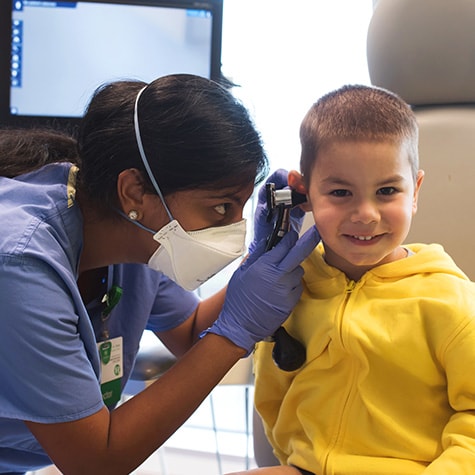
When it comes to your child, where you take them matters.
If your child has ear infections, strep throat or other issues that impact their ears, nose or throat, find a pediatric otolaryngologist or click the link below to schedule an appointment.
Make an AppointmentAdditional Resources
Lori Guillot Gentile, MD, is a board-certified Complex Pediatric Otolaryngologist at Children’s Healthcare of Atlanta, as well as an Assistant Professor of Pediatric Otolaryngology at Emory University School of Medicine. She received her medical training at Tulane University School of Medicine, completed her residency at University of Alabama at Birmingham School of Medicine, and completed her fellowship at Children's National Medical Center. As a head and neck surgery specialist, her areas of interest include obstructive sleep apnea, sinonasal disorders and cystic fibrosis, chronic ear disease, and disorders of feeding and swallowing.
This content is general information and is not specific medical advice. Always consult with a doctor or healthcare provider if you have any questions or concerns about the health of a child. In case of an urgent concern or emergency, call 911 or go to the nearest emergency department right away. Some physicians and affiliated healthcare professionals on the Children’s Healthcare of Atlanta team are independent providers and are not our employees.
Contact Us 404-785-KIDS (5437)




